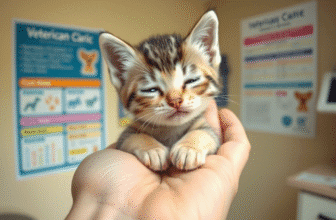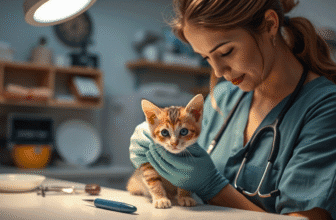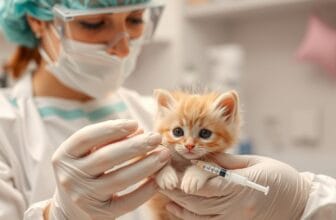
Table of Contents
As a new kitten parent, you might be wondering: when exactly do kittens lose their baby teeth? This natural process is a big step in your kitten’s growth. It can also be a bit uncomfortable for them. Knowing when kittens lose their baby teeth can help you support them during this time.
Understanding Kitten Teething
Teething is a natural process for kittens as they grow. Around 2-3 weeks old, their baby teeth start coming in. These teeth will be replaced by adult teeth between 3-6 months.
Kitten Teething Timeline
Kittens start losing baby teeth at 12 weeks or 3 months. By 6 months, they have 30 adult teeth. Some cats may need up to 9 months for all teeth to come in.
Kittens may show signs of teething like more meowing, chewing, and drooling. They might also have bleeding gums, less appetite, and crankiness. If they have a lot of bleeding or no appetite, see a vet.
| Teething Milestone | Timeline |
|---|---|
| Kitten starts teething | Around 3 weeks old |
| Kitten has full set of 26 baby teeth | 6-7 weeks old |
| Kitten starts losing baby teeth | 3-4 months old |
| Kitten has full set of 30 adult teeth | 6 months old (some may take up to 9 months) |
To soothe a teething kitten, try soft food and play. Ice cubes made from chicken broth or tuna juice can help. Soft toys and cat grass are also good options. Keeping their teeth clean and addressing issues early is key.
Baby Teeth vs Adult Cat Teeth
As your kitten grows, you’ll see big changes in their teeth. Kittens start with 26 baby teeth, which are small and sharp. These teeth help them nurse and chew soft foods as they get used to solid food.
Adult cats have 30 teeth, including incisors, canines, premolars, and molars. These teeth are bigger and have deeper roots. They are perfect for chewing and biting meat and hard kibble.
The kitten baby teeth start falling out around 11 weeks old. By 6 months, they are all gone. This makes room for the bigger, more durable adult cat teeth to grow in.
Knowing the difference between kitten baby teeth and adult cat teeth is key. It helps keep your cat’s feline dental anatomy healthy and working well all their life.
“Dental health is a critical component of a cat’s overall wellbeing, so it’s important to closely monitor their teeth and gums as they grow.”
Signs That Your Kitten Is Teething
As your kitten grows, they will go through a natural teething process. This can sometimes cause discomfort. While most kittens show few to no signs of teething, there are potential symptoms to watch out for.
These include missing baby teeth, excessive chewing or biting, and small amounts of blood on toys or gums. You might also find small teeth on the floor. Sore or inflamed gums, increased vocalization, and pawing at the mouth are other signs.
Additionally, irritability and a new preference for soft food can indicate teething. These are all signs that your kitten is going through the teething process.
Behavioral Changes During Teething
Kittens rarely lose their appetite due to teething, but dry food may be uncomfortable on their sore gums. You may notice your kitten exhibiting some behavioral changes, such as increased vocalizing, more frequent chewing, and a tendency to paw at their mouth.
These are all signs that your kitten is going through the teething process. If you observe any abnormal changes in your kitten’s behavior or eating habits, be sure to contact your veterinarian.
While teething is a normal part of a kitten’s development, it’s important to ensure there are no underlying issues or complications. By being attentive to the signs of kitten teething and behavioral changes during teething, you can help your feline friend through this transition.
“It’s important to watch for any symptoms of teething in kittens, such as missing teeth, excessive chewing, or irritability, and contact your vet if you have any concerns.”
Toys for Kitten Teething
When your kitten teething, the right toys can really help. They ease sore gums and keep them busy. This is key during this important time.
Choose soft, rubber toys made for teething kittens. These toys help with the pain of new teeth. Cold items like damp washcloths can also calm sore gums.
Make sure toys aren’t too hard to avoid tooth damage. Also, check toys often and throw away any broken pieces to stop choking.
Recently, 171 people looked for “Kitten teething toys DIY” on Pinterest. This shows more people want to make their kittens’ teething better.
| Toy Type | Benefits |
|---|---|
| Soft Rubber Toys | Gentle chewing, soothing gums |
| Refrigerated Chew Items | Provide cooling sensation for irritated gums |
| DIY Cat Toys | Strengthen bond, offer enrichment |
Offering the right teething toys can make your kitten’s teething easier. It also helps their teeth grow strong and keeps your bond strong.
What’s the Best Food for Teething Kittens?
When your kitten is teething, their food needs might change a bit. Most kittens can still eat their regular hard kibble. But, some might find it hard to chew with new teeth coming in. If your kitten seems to be having trouble, you have a few options.
One simple fix is to moisten the kibble with a bit of water. This makes it softer and easier for them to chew. Or, you could switch to a soft, wet food for a while. Just remember to introduce new foods slowly to prevent upset stomachs.
When picking food for a teething kitten, look for soft and easy to chew options. Stay away from hard, crunchy kibble that can hurt their gums. Some good food for teething kittens includes:
- Canned or pouch wet food
- Pureed kitten food
- Softened kibble with warm water or bone broth
Changing your kitten’s diet during teething too fast can upset their stomach. Watch their appetite and energy levels closely. If you’re worried about their eating or dental health, talk to your vet.
By giving your kitten the right soft food for teething kittens, you can make this time easier for them. A little care and the right food will have your kitten playing and happy again soon.
Brushing a Kitten’s Teeth
Teaching your kitten to brush their teeth is key for their dental health. But, you should stop during teething to avoid hurting their gums. Letting them lick cat-safe toothpaste from the brush is a good way to keep them positive about dental care.
Recommended Products for Brushing
Choosing the right tools is important for brushing your kitten’s teeth. Use a soft-bristled toothbrush made for cats and toothpaste that tastes good to them. This makes brushing a fun and safe experience for your kitten.
| Product | Description |
|---|---|
| Soft-Bristled Toothbrush | A toothbrush with gentle, flexible bristles that won’t irritate your kitten’s gums. |
| Cat-Safe Toothpaste | Toothpaste formulated with flavors like chicken or tuna that cats find appealing. |

Using the right tools and being gentle helps your kitten see tooth brushing as positive. This sets them up for a lifetime of good dental habits.
When Do Kittens Need to See a Vet for Dental Appointment?
Kittens start losing baby teeth around 12 weeks old. They keep teething until they are about 6 months old. By then, they have all 30 adult teeth. But, there are times when you need to take your kitten to the vet for dental care.
Look out for these signs to know when to schedule a vet visit:
- The kitten seems to be in pain or has lost their appetite
- The kitten has both adult and baby teeth present at the same time
- The adult teeth appear to be growing in improperly or are misshapen
- The kitten has very inflamed or bleeding gums, or has developed bad breath
Also, any kitten not fully grown by 6 months should see a vet.
Good dental care habits are key for your kitten’s health. A vet can spot problems and teach you how to care for your kitten’s teeth during teething.
“Regular dental checkups and cleanings are essential for keeping your cat’s mouth healthy and preventing painful dental disease.”
Watching your kitten’s dental health and getting vet help when needed is vital. It ensures your kitten has healthy teeth and gums for life.
Persistent Deciduous Teeth in Kittens
As your kitten grows, you might see a common dental problem. This is when baby teeth, or deciduous teeth, don’t fall out as adult teeth come in. This can cause teeth to grow in wrong and increase dental disease risk.
The canine teeth often stay longer, but any baby tooth can. Small breeds like Toy Poodles, Maltese, and Yorkshire Terriers face more issues with retained baby teeth in kittens.
Deciduous teeth should be gone by six months old. But sometimes, they don’t fall out. This can make adult teeth grow in crooked, causing crowding and misalignment.
Ignoring persistent deciduous teeth in kittens can lead to serious dental issues in teething kittens. These include:
- Trapped food and debris, causing tartar buildup and gingivitis
- Foul odor from the mouth due to decaying matter
- Misalignment of the jaw and improper bite
It’s important to address persistent deciduous teeth in kittens to avoid long-term dental problems. If your kitten’s baby teeth aren’t falling out, take them to the vet. They can check and decide if action is needed for your kitten’s teeth to grow right.
“Proper dental care is essential for your kitten’s overall health and well-being. Don’t hesitate to work with your vet to address any issues with retained baby teeth in kittens.
Helping Your Kitten Through Teething
As your kitten grows, they will go through teething, which can be tough for them. Luckily, there are ways to help. You can give them the right chew toys, make their environment safe, and adjust their diet and dental care. This will help ease their discomfort and support their growth.
Providing Chew Toys and Safe Spaces
Soft chew toys can really help during teething. Look for ones made of rubber, cotton, or other safe materials. These let your kitten gnaw and soothe their sore gums. You can even chill these toys in the fridge for a cooling effect.
It’s also key to kitten-proof your home. Remove any choking hazards and block off areas where chewing could damage things.
Modifying Diet and Pausing Brushing
If your kitten finds hard kibble hard to chew, try moistening it or switching to soft, wet food. Avoid sudden diet changes to prevent stomach upset. Also, stop brushing their teeth during teething to avoid discomfort. Brushing can start again once their adult teeth come in.
By using these tips, you can help your kitten get through teething smoothly. Remember, being patient and caring for your kitten’s needs is crucial during this time.
When Do Kittens Lose Their Baby Teeth?
As your kitten grows, they will lose their baby teeth. This is called the kitten teething timeline. It starts around 12 weeks and ends when they are about 6 months old. By then, they should have 30 adult feline dental milestones.
Kittens lose their teeth in a certain order. They start with the front incisors and move back. This makes the teething process easier for them.
Here’s a closer look at the typical when do kittens lose their baby teeth timeline:
- 3-4 weeks old: Kittens start growing their baby teeth.
- 6-8 weeks old: Kittens have a full set of 26 baby teeth.
- 12 weeks old: Kittens begin losing their baby teeth, starting with the incisors.
- 3-4 months old: Kittens typically lose all their baby teeth.
- 6 months old: Kittens should have a full set of 30 adult teeth.
It’s key to give your kitten chew toys and a balanced diet. Regular vet visits also help with their dental health.
Knowing when kittens lose their baby teeth helps you care for their dental health. Being proactive ensures your kitten has healthy teeth for life.
Training Kittens Not to Bite
Kittens bite and chew during teething to ease pain. But, biting is also how they communicate and play. To stop them from biting, teach them to use toys instead. Avoid playing with your hands to prevent them from biting.
Punishment doesn’t work and can scare them. Instead, use positive rewards to encourage good behavior.
Here are some tips to train your kitten not to bite:
- Give them soft toys to chew on, like rubber or rope toys.
- When they bite, swap your hand for a toy and say “no bite” firmly.
- Give praise and treats when they play with toys, not your hands.
- Play gentle games like fishing pole toys or clicker training instead of rough play.
- If they bite, stop playing and walk away to deny them attention.
With patience and consistency, your kitten will learn not to bite. This way, they’ll use their natural chewing instinct on toys. By teaching them early, you can stop kitten biting and prevent future problems.
When to Contact a Vet About Kitten Teeth
Teething is a normal part of a kitten’s growth. It’s important to watch their dental health and know when to see a vet. As your kitten teething, look out for signs that mean they need a vet visit.
If your kitten seems in pain, eats less, or drools a lot, they might have dental problems. Also, if they have both baby and adult teeth at the same time, or if their adult teeth are growing wrong, it’s time to go to the vet.
Bad breath and gums that are red, swollen, or bleeding are warning signs. Kittens who haven’t lost their baby teeth or grown their adult teeth by 6 months should also see a vet. This could mean there’s a problem that needs fixing.
Regular dental check-ups and care are key for your kitten’s health. By being proactive and getting vet help when needed, you can keep your kitten’s teeth and gums healthy for life.

“Proper dental care from a young age is essential for the long-term health and well-being of our feline friends.”
Conclusion
Kitten teething is a natural process, but it can be uncomfortable for them. Knowing when they teethe and giving them the right chew toys helps. Also, changing their diet and stopping brushing during teething is important.
Watching for dental problems and getting vet help when needed is key. This keeps your kitten’s teeth healthy.
With the right care, kittens can lose their baby teeth and get adult teeth. Starting good dental habits early is crucial. This includes brushing and vet visits.
By focusing on your kitten’s dental health, they can live a long, happy life. They’ll have healthy teeth and a beautiful smile.
Managing kitten teething requires patience and attention to their dental care. Working with your vet helps you through this important time. This ensures your kitten stays healthy and happy.
FAQ: When Do Kittens Lose Their Baby Teeth
When do kittens start losing their baby teeth?
Kittens typically start losing their baby teeth at around 3 to 4 months of age.
How long does it take for kittens to lose all their baby teeth?
The process usually lasts until kittens are about 6 months old, by which time most will have their full set of adult teeth.
What are the signs that a kitten is losing their baby teeth?
Common signs include chewing on objects, mild gum bleeding, drooling, or finding tiny baby teeth on the floor.
Is it normal for kittens to swallow their baby teeth?
Yes, it is normal. Kittens often swallow their baby teeth while eating, and this poses no harm to them.
How many baby teeth do kittens have?
Kittens have 26 baby teeth, which are replaced by 30 permanent adult teeth.
Do kittens experience pain or discomfort during teething?
Some kittens may experience mild discomfort and may chew more to soothe their gums, but severe pain is uncommon.
Should I provide anything to help my kitten with teething?
Yes, you can offer kitten-safe chew toys or wet a washcloth and freeze it for them to chew on, which can help ease discomfort.
What should I do if my kitten’s adult teeth don’t come in properly?
If you notice misaligned teeth, retained baby teeth, or signs of discomfort, consult your veterinarian for an evaluation and treatment.
Is it necessary to clean a kitten’s teeth during or after teething?
Yes, establishing a dental care routine early is important. Begin gently brushing their teeth with a kitten-safe toothbrush and toothpaste once their adult teeth emerge.
Source Links
- Kitten Teething: Do Kittens Lose Their Teeth? – https://www.kinship.com/cat-health/do-kittens-lose-their-teeth
- Kitten Teeth | Teething Kittens & Kitten Teeth vs. Cat Teeth – https://www.embracepetinsurance.com/waterbowl/article/baby-teeth-vs-adult-teeth-in-cats-and-dogs
- Spring House Animal Hospital – https://www.springhouseanimalhospital.com/site/blog/2024/07/15/kitten-teething
- Gentle Doctor Animal Hospital – https://www.gentledranimalhospital.com/site/blog/2024/06/30/kitten-teething
- Palmyra Animal Clinic – https://www.palmyraac.com/site/blog/2024/06/15/kitten-teething
- Understanding Cats’ Teeth: Feline Dental Development – https://nootspets.com/blogs/news/understanding-cats-teeth?srsltid=AfmBOorMwLPiQk-5ZNkCOLcfknXlZE8iNgm13UMbZcpu5MkkzkTyEOji
- New England Animal Hospital – https://www.newenglandanimalhosp.com/site/blog/2024/01/15/kitten-teething
- Signs Your Kitten Is Teething and What to Do – https://www.dailypaws.com/cats-kittens/health-care/kitten-care/kitten-teething
- Losing Baby Teeth: An Owner’s Guide To Kitten Teething – Vetster – https://vetster.com/en/wellness/losing-baby-teeth-an-owner-s-guide-to-kitten-teething
- Kitten Teething Toys Diy – https://www.pinterest.com/ideas/kitten-teething-toys-diy/953663121036/
- Understanding Cats’ Teeth: Feline Dental Development – https://nootspets.com/blogs/news/understanding-cats-teeth?srsltid=AfmBOopjetubF7RZUsfpxZkrVKpmBJemw7P8XbGdoL9PrdO41Ay8TiKZ
- Is Your Kitten Teething? Here’s What To Expect And How To Help – https://citybear.co/blogs/citybear-blog/is-your-kitten-teething-here-s-what-to-expect-and-how-to-help?srsltid=AfmBOorrGypF6oBGSpAzrHbxunaqCX-CLnLJnbMFuHBmmptY9g236ZG2
- Bruceville Pet Hospital – https://www.brucevilleph.com/site/blog/2024/05/31/kitten-teething
- Is Your Kitten Teething? Here’s What To Expect and How To Help – https://be.chewy.com/what-to-expect-with-kitten-teething/
- Guide to Caring for Your Kitten’s Teeth – https://www.purina.com.au/caring-for-your-kittens-teeth.html
- How to Help Kittens Chew Their Way Through the Teething Period – https://coleandmarmalade.com/2023/10/19/how-to-help-kittens-safely-chew-their-way-through-their-teething-period/
- Kitten teething advice | Blog – https://www.cats.org.uk/cats-blog/kitten-teething-advice
- Retained Deciduous Teeth – Veterinary Dental Center of Atlanta – https://vdcatlanta.com/retained-deciduous-teeth/
- Animal Medical Center – https://www.24hrpetvet.com/site/blog/2024/01/30/kitten-teething
- Understanding Cats’ Teeth: Feline Dental Development – https://nootspets.com/blogs/news/understanding-cats-teeth?srsltid=AfmBOoryk6JyWUwumO_V9Fzrvkc3M5krmeCEkcnZAcrrBkYm-yeV8GoO
- Kitten Teething: Signs & How To Help A Teething Kitten | Purina – https://www.purina.in/articles/cats/kitten/health/kitten-teething
- Is Your Kitten Teething? Here’s What To Expect And How To Help – https://citybear.co/blogs/citybear-blog/is-your-kitten-teething-here-s-what-to-expect-and-how-to-help?srsltid=AfmBOoqaNijT67ODmNi4UOWa01Ff4rVY-Q-T64QG57hCAXJ1JlLyA4Ks
- Is Your Cat Losing Teeth? What’s Normal & When to Worry (Vet-Verified) – Catster – https://www.catster.com/cat-health-care/cat-losing-teeth/
- Do Cats Lose Their Teeth? – https://www.trustedhousesitters.com/blog/pets/do-cats-lose-their-teeth/
- When Do Kittens Lose Their Baby Teeth? Dental Facts & FAQ (Vet Answer) | Hepper – https://www.hepper.com/when-do-kittens-lose-their-baby-teeth-vet-answer/
- The Best Ways To Stop a Kitten From Biting – Cats.com – https://cats.com/stop-a-kitten-from-biting
- How Does a Kitten Change From Six Months to One Year of Age? – https://www.thesprucepets.com/your-kittens-first-year-552271
- Understanding Cats’ Teeth: Feline Dental Development – https://nootspets.com/blogs/news/understanding-cats-teeth?srsltid=AfmBOoplfSiMfUw0Dy_4U3oUnfN2BP_Mfe7yAnQ0-deP0vHrcjh4Zxpd
- Is Your Kitten Teething? Here’s What To Expect And How To Help – https://citybear.co/blogs/citybear-blog/is-your-kitten-teething-here-s-what-to-expect-and-how-to-help?srsltid=AfmBOopneksxeeaN-xU-BK7Ws5e2PzRj1Q0zmTeIQWMEHsvRHI5GASvZ
- How Many Teeth Do Cats Have? A Guide to Your Cat’s Dental Health – https://www.thedoorbuddy.com/blogs/door-buddy/how-many-teeth-do-cats-have?srsltid=AfmBOor9Ilmt_aEvj1nIkLyJQ6jRWaxBTlm3bM7hJj8eOQAa4XmllVpC








[…] Emerging baby teeth […]